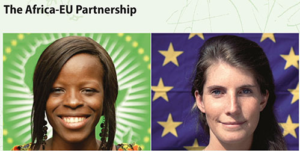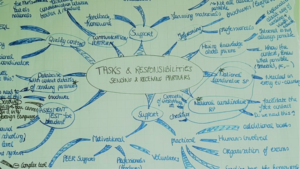Weekly Roundup
 KA3: Joint Qualifications in Vocational Education and Training
KA3: Joint Qualifications in Vocational Education and Training
The Erasmus+ call for proposals for Joint Qualifications in Vocational Education & Training (VET) is now open.
Call: Support for Development of Audiovisual Content – Single Project
Key Action 3: Support for policy reform
Deadline: 31/01/2018
More information can be found here.
 eTwinning Featured Group ‘Coding at Schools’
eTwinning Featured Group ‘Coding at Schools’
Want to promote thinking skills and new technologies in the classroom? Check out the new eTwinning Featured Group ‘Coding at Schools’, kicking off during #codeweek!
Thinking skills (computational thinking, critical thinking, problem-solving, creativity, originality, strategizing) are some of the most important skills that teachers are expected to develop in their students.
eTwinning is continuing to promote innovation, creativity and critical thinking by introducing the new Featured Group ‘Coding at Schools’ that will help teachers introduce coding concepts in the classrooms and develop the computational thinking. One of the most important aspects in learning using coding in the school activities is that students can face a new way to frame thinking by solving problems.
Click here to access the recording of the webinar. For more details please click here.
 The 5th Africa-EU Summit
The 5th Africa-EU Summit
Coming up: the 5th Africa-EU Summit will be held on 29-30 November in Abidjan, Cote d’Ivoire.
The EU-Africa strategy means great news for Erasmus+, as it focuses on the educational partnership between the two regions, with a focus on the empowerment of youth, and vocational training mobilities.
Erasmus+ opportunities extend worldwide, and the countries in Africa, the Caribbean and Pacific are no exception. The Summits of Heads of States and Governments take place traditionally every three years alternatively in Africa and Europe. These Summits take stock of the progress made in the implementation of commitments made and provide political guidance for further work.
Learn more by clicking here or here.
 Storytelling – a new approach for empowerment of persons under risk of exclusion
Storytelling – a new approach for empowerment of persons under risk of exclusion
Significant changes in modern European society are on the hike. Facing challenges within the scope of its multiculturalism, diversity and social inequity brings along different regulations, strategies, plans and measure towards creating equal opportunities and quality of life for all.
The partnership consortium from 6 European countries (OZARA d.o.o. from Slovenia, BBRZ Österreich from Austria, Ceres Europe (NI) Ltd UK Northern Ireland, EOLAS S.L. from Spain, Imagine d.o.o. from Slovenia, UNIPOSMS – Università Popolare Nuova Scuola Medica Salernitana from Italy and The Storybag from Netherlands), participating in E+ KA2 project aims to tackle the advances of such approach by developing a storytelling professional training (C-VET).
The E+ project is aimed at professionals working with disadvantaged groups to empower them for social integration, active citizenship and creation of their own better future.
Want to find out more? Visit the web page.
 A step forward for an ESOL Strategy for England
A step forward for an ESOL Strategy for England
England has taken a step forward in developing a national ESOL strategy as English language teachers renewed calls to Whitehall.
The call comes as NATECLA (National Association for Teaching English and other Community Languages to Adults), a forum and professional organisation for ESOL teachers, marks one year since the launch of the document ‘Towards an ESOL Strategy for England’.
To find out further information about the NATECLA-led document ‘Towards an ESOL Strategy for England’ visit the website site by clicking the link here.
The ESOL Strategy document can be downloaded from the NATECLA website here.
 World Food Day
World Food Day
Commission continues action against food waste and food poverty by facilitating food donation. The Commission adopted today guidelines to facilitate food donation in the EU, a key deliverable of the Circular Economy Action Plan. The aim is to clarify relevant EU legislation and help lift barriers to food donation.
You can find EU guidelines on food donation here. For more information about the project, please click here.
 Heritage Interpretation: enhancing (adult) learning in heritage contexts
Heritage Interpretation: enhancing (adult) learning in heritage contexts
Heritage interpretation can be seen as a structured approach to non-formal education, specialised in communicating significant ideas about a place to the public. It establishes cognitive and emotional links between visitors and what they can discover at a nature reserve, a historic site or a museum.
InHerit was a Grundtvig Multilateral project aiming to improve the learning experience of non-captive audiences visiting heritage sites and museums by developing the interpretation competences of all relevant professionals on site. InHerit targeted managers, guides, media programmers … in heritage organizations willing to invest in better interpretation for better outcomes in terms of connecting with the audience.
Do you want to know more about Heritage interpretation? Click here.
 Registration for the final FORINER conference open!
Registration for the final FORINER conference open!
The final FORINER conference is fast approaching and will take place in Brussels on 28 November 2017, where the partners will ensure that important steps are taken to provide more and better distance education to foreign national prisoners throughout Europe.
The event is addressed to:
- Practitioners and policymakers in the field of adult education/prison education
- Educators or teachers working within custodial estates
- Staff members of prison services throughout Europe
Please remember that this event is completely FREE to attend, but registration is required as seats are limited.
 Everyday Maths: Numeracy and Family Learning
Everyday Maths: Numeracy and Family Learning
24% of adults in the EU scored at or below level 1 in numeracy in the OECD’s Adult Skills Survey (PIAAC). This suggests that one in four Europeans do not have the numeracy skills considered necessary to successfully participate as active members of society.
Vox (now Skills Norway). Maths-Aid is a digital learning tool consisting of numeracy tasks related to topics from everyday life. The objective is to give adults an opportunity to refresh their own maths skills and also to improve their ability to help their children with their homework.
The online tool has been translated into English and you can access it here.
Prepared by Magda Seidelmannová

